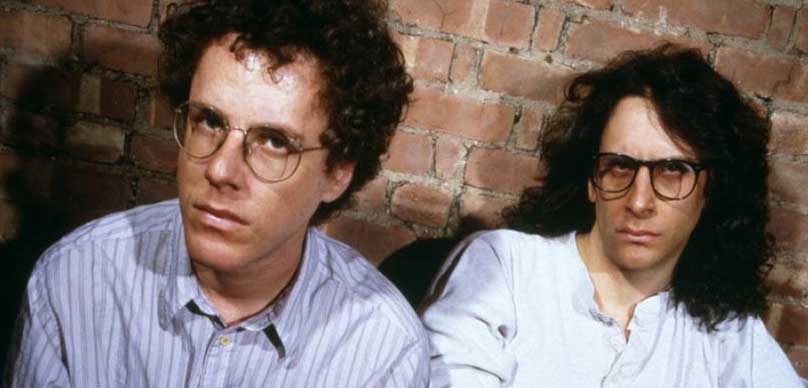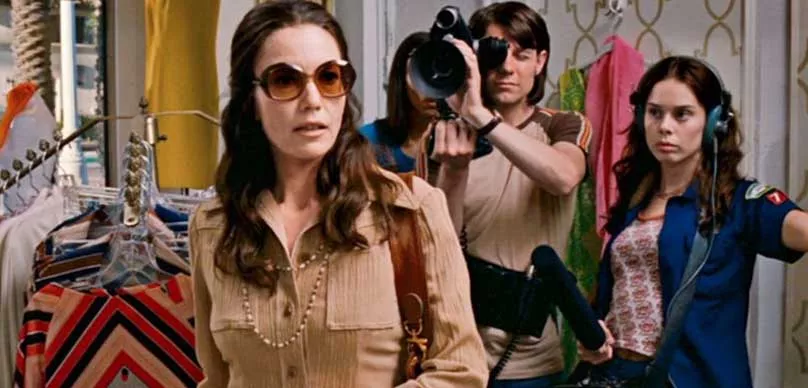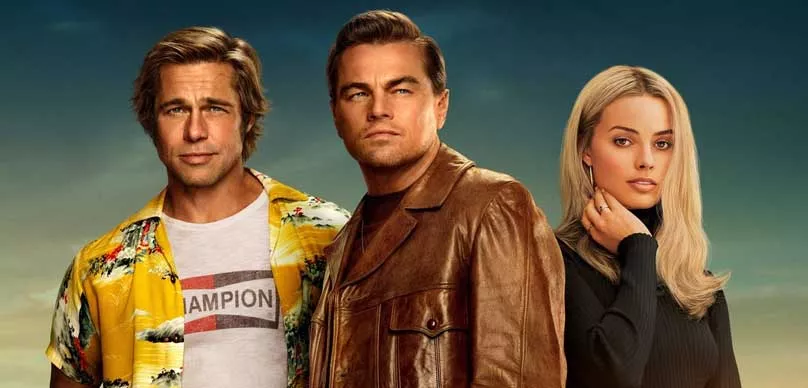Many film lovers believe that the legendary directors stick to a “signature style, look or genre.” When looking a true auteur’s film, we must immediately be able to recognize it as being Scorsesian, Tarantinoian, or Godardian. We must feel the director’s unmistakable touch in the dialogue, notice typical approaches to framing and editing, or identify a unifying style throughout their work.
Watching Mulholland Drive without any prior context, we should be able to identify it as a David Lynch film. Certain elements of the mystery genre are so linked with Hitchcock, we view them as parody or pastiche in other films. This way of looking at directors holds up in some cases and erodes in others. In the case of the Coen Brothers, it does both.
Perhaps no other contemporary filmmaker (or fraternal filmmaking duo, to be precise) weaves in and out of typically-rigid film genres as artfully as the Coen Brothers.
Download ALL of the Coen Brother’s Screenplays in PDF!
Upon first glance, a film like Hail, Caesar may appear completely incongruous with a film like A Serious Man. Even within the generic conventions of the Western, the Coen Brothers offer up entirely different films, from a musical reworking of the Odyssey in the whimsical O Brother Where Art Thou, to the relentlessly cruel thriller No Country for Old Men, both faithful additions to the Western genre.
And yet even in their darkest works (including No Country, which is multiple shades darker than any other) a unifying thread runs through the Coen Brothers’ work: a dark, clever comedy that works its way into the most unlikely moments. The black humor of the accidental crime is perhaps the most potent: the botched kidnapping in Fargo or the closet scene in Burn After Reading are so simultaneously absurd and tragic we can only laugh.
Steve Buscemi, down to his role in the ridiculous short film in Paris, je t’aime, is the perfect muse for this delicate comedic moment that plays over and over again in the Coen Brothers’ work.
Indeed, while the Coen Brothers shift between genres with ease, there are a number of narrative motifs they carry with them. Even their most dissimilar films share recurrent themes of disillusionment, criminality, subjective codes of morality, accidental violence, a striving for purpose and the nobility of the epic -if misguided- quest.
No matter what the genre, the Coen Brothers return to variations on the comedy of errors, each time in a new and innovative way, and with a touch of dark humor rarely found elsewhere.
The below video, courtesy of the Film Society of the Lincoln Center, features an in-depth interview with these two idiosyncratic filmmakers, and provides further insight into their shared creative process.
When working back through the Coen Brothers’ filmography, teasing out the themes of their films and listening to their own reflections on their work, that old commonly-held belief about “signature” directors rings both true and untrue. For from Fargo to The Big Lebowski to O Brother Where Art Thou to True Grit to The Man Who Wasn’t There to Burn after Reading and beyond, each of the Coen Brothers’ films is at once recognizable and unrecognizable, unique and akin, characteristic and chameleonic.
Check out this remarkable video with four-time Oscar-winning filmmakers Joel and Ethan Coen for a rare, career-spanning discussion of their work, moderated by Noah Baumbach.
Spoiler
THE COEN BROTHERS
What I have is two of the finest contemporary directors working today, Joel and Eaton Coen have carved up the formable niche for themselves as in the world of cinema. Their works in exercise and dichotomy often times dark and heavy subject matter approached from a rye comic view point.
This approach has given the Coen brothers one of the most original voices in film making and each film has managed to accumulate its own dedicated cult (36) of followers.
They often credit their sardonic intellectual oriented world view to their Jewish up brining in the suburbs outside of Minneapolis, Minnesota by parents who both work in collegiate academia.
Joel arrived first in 1954 and Eaton followed three years later in 1957. Their childhood in the St Louis Park area, an enclave for Jews and Russians in an otherwise predominately Christian state gave the two brothers something from an outsider’s point of view towards life as well as their art.
Indeed their best work often assumes the advantage point of a protagonist at odds in its environment. The duo was famously adverse to critical analyses of their work they take every opportunity to take the piss out of critics and analysis who assign any of their films with a quote and quote deeper meaning.
They no doubt would be quick to dismiss this very video series as a frivolous waste of time, and their advise to interpret filmography (1:28) that actively defies interpretation. Never the less the Coen’s are a major force in American Independent Film and is very much worth the risk of coming across like a pompous intellectual if it will bring some valuable insight to their cinematic legacy.
The Coen’s became an admirable film making at an early age making their own home grown super eight millimetre movies with neighbourhood friends and a camera their brought using their savings from mowing neighbours lawns.
Their dry sense of humour but by now their stylish signature and a major aspect of their cultural appeal was apparent even at the beginning, judging by such humourlessly hideously and Craddick(2:01)titles such as Henry Kissinger Man on the Go and (2:06) and Zambia.
Upon completing high school both Joel and Eaton went on to study at Barb College in Massachusetts from there Eaton went on to Princeton while Joel went on to New York University and made the short film SOUNDINGS, a project that marked the beginning of the series of the pursuit of professional film making.
After graduation Joel found work as production assistant on various industrial films and music videos working his way deeper into the industry until he landed a gig as an assistant editor on a feature film for an enterprising young director that director was Sam Ramey, the film was 1981 iconic hit THE EVIL DEAD.
Ramey proved an invaluable ail when it came time for the Coen’s to once develop their own feature, a violent western neon war hybrid title Blood Simple. The tile came from the term by novelist (2:55)Dashel Hent used to describe the other than fearful mind set people are prone to fall into after becoming involved into a violent situation.
The Coen’s felt it a fitting title to bestow on their kinky crime thriller about the fatal consequences of infidelity and miscommunication, whose tone took a page from the Ramey play book by blending lowered pop and violence with touches of sardonic humour.
The existence of Blood Simple owes a lot to Ramey’s mentorship, in the absence of any connections to studio money Ramey convince Joel and Eaton to create a two minute picture trailer for the film featuring the evil dead star Bruce Campbell as a man pulling his broken and dead body along the desolate stretch of high way.
The Coen’s then went door to door showing neighbours their pitch trailer in the comfort of their own homes and within a year they had raised roughly half of their 1.5 million dollar budget enough to begin production.
In the fall of 1982 Joel and Eaton began production of their first feature film shooting in the oustedent (3:45)huddle areas of Texas over the ensuing eight weeks.
Clip…” You shouldn’t have taken the fucking money, look at me man I am serious. You broke into the bar and you rip off the fucking savings Abbey warned me about you. you know what your problem is, you too fucking obvious the only two people with the combination is you and me and Abbey maybe, this fucking thing is nothing.”
BLOOD SIMPLE playing, Blood Simple illustrate the signature Coen’s story telling trail whereby they take a basic story and layer in with a series of pop twist and genre amarjos (4:22) to create a wholly original work.
While the film story is morbid and dark the brothers openly acknowledge the share absurdity of the visionary and their characters without playing them for last, so too does the cast who wholly embraced the material and make it even funnier with their convincing stone face performances.
For the central role of Abbey the housewife whose affair with her husband’s employee kicks of the series of violent turns. The Coen’s initially wanted Holly Hunter, she wasn’t available but she knew someone who could knock it out of the park, her roommate Francis McDermott.
If only the Coen’s could have known then how profoundly this fateful little development would shape their personal and professional lives. Not only would McDermott’s debut and performance here marked the beginning of a highly accomplished acting career it would also lead directly to her marriage to Joel in 1984.
Clip…” You have not been acting like yourself, first you call me at 5.a.m. saying all kinds of nice things on the phone and then come charging in here scaring me half to death without even telling me what I am supposed to be scared off.”
McDermott’s performance in Blood Simple is a highly memorable one, with a relaxed femininity and a syrupy Texan drawl and a cunning intelligence and a super human ability to keep it together under extreme stress.
Her character goes against the grain of its arrows gender archetypes and a razor tense showdown with Ann Walters antagonist charter at the films climax serves as a great show at least at the salty courage and determination that McDermott can convey.
Clip…”Where you going, to see dad, right don’t go to bar I know it aint a good idea I just got to see dad.
As Abbey’s lover and Amos bar keep Ray, John Guest doesn’t get a lot to say but, his soulful eyes speaks volumes about the character.
Clip….”What you smiling at, I am funny right, I am an asshole, no, no, no that’s not what’s funny what’s funny is her, what’s funny is that I had you two followed because if it is not you she is sleeping with its someone else and what’s really going to be funny is when she gives you that innocent look and says “I don’t know what you talking about Ray, I ain’t done anything funny.
The opposite goes for (6:38) who choose the scene which he is in as Julian Marty and the only vindictive man who isn’t afraid to get his own hands dirty.
Adelia is an interesting casting stories as his physicality’s seem to lend himself more towards east coast gangster figures instead of cowboy neon wars, but his casting echo’s like a fish out of water sentiments no doubt felt by his directors, a pair of Jewish film makers from Minnesota emerging themselves in the country western landscape of deep Texas.
Clip… “I hope your wife really loves you because it ain’t 5 weeks and you can’t wipe your own God dam ass.”
As (7:11) the film chief antagonist therefore mention the walls fore mentionable and congenial presents, he is clearly having the time of his life with his jolly plump cowboy stick that characterization that’s rather chilling by his relentless benevolence in the third act.
There is a reason why Walsh is featured in the films promotional material above everybody else, his performance sears its way into your brain.
To create the films uncompromising work and carefully balanced tone the tone’s director and photography Barry scienfell who would later go on to become a director in his own right.
As the legend goes Joel had met Scienfell during a party having hit it off quite nicely having sitting there the only two Jewish people in attendance. Shooting on a 35 millimetres film Scienfell the 185-1 frame with warm strong colours inky blackness with lowered blurred neon and hot dessert night and shocking guises of crimson blood.
The Coens met with strong imagery already apparent there, regularly show casing memorable imageries that were to be enforced in narrative themes, like the final shot showing Emmett dying respective of the underside of the bathroom sink.
Light streaming through bullet holes in the wall or even pools of blood seeping up through a towel hastily thrown over the back seat of a car.
For the most part the Coens used classical camera movements like dollies and crayons to tell their story, however these tried and thru techniques are also used in some instances to convey their subtle sense of humour.
One memorable instances finds the jolly shot moving across the bar towards a drunk man who has fallen asleep and threaten to block the cameras flow of movement, instead of cutting the Coens simply popped the camera over him and continued along as if nothing ever happened.
This visual inventiveness extends to several creative transition shots, like the one where a camera swings around as McDermott goes from a standing position in the bar to her lying asleep in her bed several miles away all captured with a single unbroken shot.
Ramey’s influence is even further felt in a hand held shot that races in on a character of break neck speed its technique used quite extensively by Ramey himself in the EVIL DEAD.
Beginning here with BLOOD SIMPLE the Coens also perform the editing themselves under a fictional pseudonym Roderick Jaynes, as a true testament to their other mastery to their craft when they can perform the writing, directing and cutting of a picture without compromising the quality of any part of the process.
The (9:48) composed by Carber Berwell in his first feature like effort as appropriately poppy and lured an enormously spared piano name is complimented by an electronic (9:56) that buzzes with sharpness and malice, while also pay emoji (10:00)to the seventy slash with thriller sounds pioneer by the likes of John Carpenter.
Clip….”Hey Marty.
The exaggerated audio motif of the swirling ceiling fan gives the films sonic landscape arithmetically picostic flavour that drives out her sense of suspense and intrigue. An inspired mix of country and R&B and Spanish folk music fills out BLOOD SIMPLE sound track ever fleck the diverse multi cultural landscape of rural Texas.
The Coens lifelong fascination with the traditions of American music is modestly reference for the first here with the Four Tops hit track is the same old song featuring promptly over several scenes. There is a few other classical Collin throbs all of which are making their first appearance here.
Clip…”The world is full of complaints(11:22) the fact is nothing comes with a guarantee. Now I don’t care if you are Pope of Rome, President of the United States Man of the Year something can all go wrong.
There is a moody prolong set along the shores of the empty landscape while low key voice over and a strong regional dialect uses about the setting and the films themes. Many colour films starts this way a technique that is no doubt influenced by Billy Wilder similar incorporation advice throughout his own filmography.
Clip…”In Paris people eat petal (11:57) in Paris people make love well perhaps that’s not better but certainly more often.”
BLOOD SIMPLE also introduce the Coen’s pension for positioning antagonist as middle class men and women. Collin Folk were able to provide street level view of the action and sit comfortable between the desperation of poverty and the complacency of wealth while the observing and commenting on the absurdities of either station.
This conceit manifest visually be the iconography of Americana, BLOOD SIMPLE prominently features the uniquely American brand like Converse sneakers Miller Highlight Beer and Cadillac cruisers.
Despite the films self seriousness the Coen’s indulge every opportunity to playfully insert argons expectations the recurring images of fish rottening on a desk while hiding visitors easily identifiable forgotten later is about as literal as red herrings come.
BLOOD SIMPLE Plays like an early version of the Coen’s Oscar winning masterpiece NO COUNTRY FOR OLD MEN, both films are sparse of dialogue and heavy on atmosphere.
Clip…”Well what? What, what?
Some of BLOOD SIMPLES most memorable sequences such as the intimate live burial scene contain no dialogue whatsoever. Beyond the town in a rural Texas setting the similarities include the use of sound effects as the suspense generating device or the sudden premature death of the male protagonist.
Both are routing crime drama although NO COUNTRY FOR OLD MEN enjoys the benefits of nearly two decades of professional film making experience and sells it seriousness quite readily. The grit of BLOOD SIMPLE on the other hand feels slightly forced almost over compensatory.
That being said BLOOD SIMPLE is still an extremely effective thriller and a striking debut film made all the more special by the careers of the Coens cultivated for themselves in the year since, the finish film has turned down by every major Hollywood studio but have proved to be a big hit on the (14:15) circuit taking home the grand jury prize at Sun Dance and winning best director and best male lead at the Independent Spirit Awards.
After its selection into the New York Film Festival the Coen’s end the deal with Circle films to distribute the film around the US.
The small box office returns were to be expected but the Coen’s were most likely did not anticipate how much the film would resonate with critics. BLOOD SIMPLE has enjoyed a particularly healthy after market life with a retool the director’s cut premiering at the 1998 Austin film festival to wider claim and before restoration being performed in 2015.
Typical of the Coen’s (14:48)natural ability to defy expectation their directors cut actual clocks in at 3 minutes shorter than the original version thanks to tighter edits and some shots that withdrawals altogether.
With BLOOD SIMPLE the Coen’s had to established themselves as some formable new force in the realm of independence cinema. For their follow up the Coen’s approached Circle films with the long gestating strip of theirs titled THE HUDSUCKER PROXY.
The anticipating budget proved too high for Circle to reasonable cover however, so the Coens turned their engine to a much smaller and more realistic idea influenced by the mad cap capers of Preston Sturgis they wanted their second feature to be almost the polar opposite of BLOOD SIMPLE’S movie tone. In other words they wanted to make a zany live action cartoon that would illustrate comedic side of their artistic identity.
Armed with the significantly higher budget than their last go around about 5 million the Coens ventured back out into the high desert of the American Southwest for a 10 weeks shoot that will result in 1987 RAISING ARIZONA.
Well aware of the phenomenon of the software slump the Coens poured as much style energy and pure eye candy as they could into their second large scale effort and would come out the other end with a device heist comedy that demonstrated this year’s breath of their dictorial range.
Clip…”What’s the matter? I am sorry honey it just didn’t work out. I know it didn’t work out. Well they started crying and they were all over me it was kind of horrifying, honey let me in. Stop that crap baby stop. I know that now come on honey we got to leave. You go right back up there and get me a toddler I need a baby Hi, they got more than they can handle. Oh, honey. Don’t you come back here without a baby!
Thanks to the critical success of BLOOD SIMPLE, the Coen’s were able to secure an ecliptic group of fairly well know faces for RAISING ARIZONA with its ridiculous mutton shops and meth head stares, a young Nicholas Cage was perfectly cast as career screw up as HI McDonna.
Clip…” I am talking about wife swapping. I am talking about what they now call now a day’s open marriage. I am talking about … Keep your God dam hands off my wife. I was only trying to help. Keep your God dam hands off my wife.
Cage has acquired something of a reputation as a problem flab orator but, there is no denying his actions comes from a place of un viral passion and eccentric conviction. The Coen’s reportable had a tensed yet respectful working relationship with Cage who would go frustrated when they decline to consider the various ideas he kept bringing to the table.
Clip… “You tell them I am leaving tomorrow morning now I got nothing against you personally but you are wanted by the authorities and you are bad influence in this household in my opinion.”
The role of HI’s wife a sweet police office name Edwina was written specifically for Holly Hunter who finally made herself available to work for the Coen’s after turning them for BLOOD SIMPLE.
Clip…”I want that baby! Give that baby you whore hog from hell.
She was a great flow for Cage with a resort nature that helps keep the film grounded and make sure eventual break down into hysterics even funnier.
Clip…”I love him so much.
Together it’s all be apparent transforms into a couple of folk heroes all to right what they perceive to the natural injustices of the world, like say the local furniture tycoon’s and his wife giving birth to quintuplets when Ed herself can’t bear any.
John Goodman is a common fixture throughout the Coen’s work and he makes his first appearance in their filmography here as Gayle Snorts an old friend of HI’s who has sprung himself out of prison with his younger brother Avail played by William Foresight.
Clip…” I (18:26)handy with a scatter gun cover them a/c while we go in there and get that cash. You understand HI if this works out it is just the beginning of a spreed to cover the entire Southwest proper and we keep going until we can retire or we get caught.
Together these two serve up as much trouble for our two (18:44) as they do laughter for the audience. Randal Tex Cobb plays a wild bounty hunter named Leonard Smalls or to put it another way the lone enforcement of the apocalypse looking like he just walked off the side of the road warrior.
Cobb is a fierce presence that puts the fear of God into people’s hearts as he tears through the desert on his chopper. The character cartoonishly over the top all fire and brimstone, but he works well within the film because he is meant to be a manifestation of McDonald’s own outlandish imagination.
A few familiar faces from BLOOD SIMPLE return all be it in smaller cameo roles, Francis McDermon shows up briefly as Dot a chatty friends of Ed’s with a clinically supple of overbearing motherly advice.
Clip…” Then there is a dip theory with a technis that they call the dip tip, you got to get them dip tech boosters yearly or else they will develop lox jaw and night vision.
And Emit Walsh also appears as a fellow worker at the steel drilling plant where HI is employed.
Clip….”Me and Bill patrolling down 9 mile, Bill Roberts? No not that mother’s cracker, Bill Parker.
His face maybe covered in grime but, that ominous laugh of his cluster the noise of machinery like a laser.
Clip…”We are doing the right thing aren’t we Hi? I mean they had more than they could handle. Well now honey, we have been over this and over this and here is what’s right and there is what’s right and there is twins (20:00) you need.
The characters floored dialogue style marks the stark departure from roughness of BLOOD SIMPLE which was engineered by the Coen’s to be a mixed of the local Arizonans dialect and a particular language text to be absurd from their reading material namely magazines and the bible.
The Coen’s greeting with Barry (20:19)to create completely different look to RAISING ARIZONA which speaks to their ability to handle diverse visual styles and camera work, whereas BLOOD SIMPLE was verbatim darkness and ways of concentrating light.
RAISING ARIZONA is 185-1 35m film image is brightly lit in an as seemingly saturated with colour like a tax aviary cartoon. The brother’s friendly action is much lighter this time around with a deep focus which highlights his (20:40) theatricality to return production designer James Mercury’s sets.
The camera work is exceedingly more dynamic than BLOOD SIMPLE’S showcasing the films exteriority and brilliance via a sweeping cranes and jolly shots and fanatic action sequences lays with humour. The influence with Sam Ramey is further in RAISING ARIZON whose small number of shots in adopting evil death style respective where in the camera rushes at great neck speed towards its target jumping in lightning in many obstacles along the way.
Interestingly enough RAISING ARIZONA is one of the few Coen films that the brothers did not edit themselves instead handling over that particular honour to Michael R. Miller.(21:26) returns to provide score a fullsy (21:28) theme comprise of angels whistle and (21:32).
A perfectly complements both the uncertain nature of the story as well as the red neck qualities of its characters.
Clip…”Well I couldn’t help thinking that a brighter future lay ahead, a future that was only 8-14 months away.”
This is a Beethoven classical works also adopt the film in providing an ironic high class counter point to the proceedings.
Several humanic ideas and images that the Coen’s established with BLOOD SIMPLE can also be found in RAISING ARIZONA, further colour lessing (22:02) the particular aesthetic into its own highly identifiable and contained universe.
The film takes place this I believe within Middle America in a vast expansive desert the coastal league would know as fly over country. The protagonist or for a lack of a better term trailer trash and their aspirations reach only as high as creating only a small family for themselves.
McDonna is an outsider in his own environment deemed unfit by the government to adopt the baby because of his expansive prison record.
There is no struggle between the rich and the poor here everyone is more or less on the same socio economic level even the local business tycoon derives his modest wealth from a decidable unglamorous market unpainted furniture. Convenient stores trailer homes and even tattooed images of woody the woodpecker contributed to the Coen’s grand portfolio of Americana inspired imagery giving the film unique identity all on its own.
RAISING ARIZONA screened out of competition of the film festival marking the Coen’s debut on the world stage. The film received mixed reviews but some critics turned out by the abrupt tone of reversal from BLOOD SIMPLE.
However, RAISING ARIZONA has persisted through the years solely accumulating a loyal co following typically of the brother’s lesser or known works. (23.13)of the films wildly entertaining the casting crew are clearly having so much fun with the material that it is impossible not to get swept away in their infectious enthusiasm.
Clip….”Son you got a panty on your head. Just drive fast.”
Despite their stark differences BLOOD SIMPLE and RAISING ARIZONA are never less united in their independent production values, shared South western setting and letters on the run narrative frame work, together they established a particular dichotomy that has become one of the Coen’s signature an easy isolation between drama and comedy that is made for one of the most versatile yet consistently with (23:51) filmography is the art form I have ever seen.








